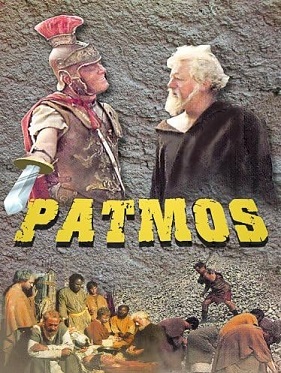First released in 1985, Patmos imagines the final days of St. John the Evangelist.
The film opens with John (Louis Rolston), the last surviving member of Jesus’s original disciples, having been arrested by the Romans and sentenced to the penal colony of Patmos. At Patmos, he lives in a cave and, despite being an elderly man, he is expected to take part in hard manual labor. The commandant of Patmos is Catalinus (Mark Mulholland), an arrogant centurion who is known for his temper. For Catalinus, being assigned to Patmos is a bit of a demotion and he’s eager to take his anger out on John.
John, however, refuses to allow Catalinus to break him and his quiet dignity starts to impress some of the Roman centurions. (“I’m not paid to think,” one centurion replies, when asked for his opinion on John.) It also starts to impress John’s fellow prisoners. When John starts to have visions of the eventual apocalypse, the other prisoners help him to record them. When Catalinus starts to execute the other prisoners and demands that John renounce his religion and his visions, John is faced with a difficult decision. Should he claim to have rejected God or should he stand firm in his beliefs, even in the face of Catalinus’s cruelty?
Well, there’s never really any question as to what John is going to do. This film was made to be shown in church basements and at religious camps so there’s no way that John is going to renounce his faith. That said, the film deserves a good deal of credit for not making it appear as if John’s decision was an easy one. Everyday, as John is led out of his cave, he has to pass the people who have been crucified in an attempt to intimidate him into silence. His fellow prisoners soon start to demand that John give into Catalinus’s demands, even as John tries to explain why he cannot. Catalinus’s cruelty is actually supported by what we know about the techniques that some Romans used to keep order in their prison colonies so the idea that he would execute everyone but John is not an outlandish one. The cruelty, as the saying goes, is the point.
(Indeed, Catalinus’s arrogance and his anger at being defied should seem familiar to anyone who has ever had to deal with a middle management bureaucrat.)
That said, when a film is called Patmos and deals with the final years of St. John the Evangelist, most people are going to be watching because they want to see how the film portrays the visions of revelation. Patmos, being a low-budget film, goes for a simple approach. We see horsemen riding across Patmos, each bringing a plague to Earth. There are occasional shots of people begging for food and there’s also a sepia-toned sequence that takes place in Heaven. As I said, it’s simple and it’s obvious that the film’s low budget played a huge role in how the apocalypse was presented. But that simplicity is actually rather effective. After sitting through so many flamboyant and over-the-top portrayals of the end of the world, it’s hard not to appreciate the starkness of Patmos’s imagery.
The acting is a bit uneven but Louis Rolston is appropriately wise as John and Mark Mulholland is appropriately arrogant as Catalinus. Patmos is an effectively done apocalypse film, one that makes good use of its low budget.
